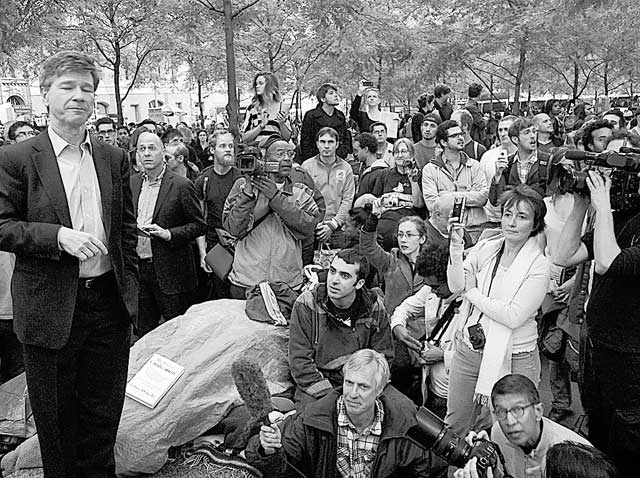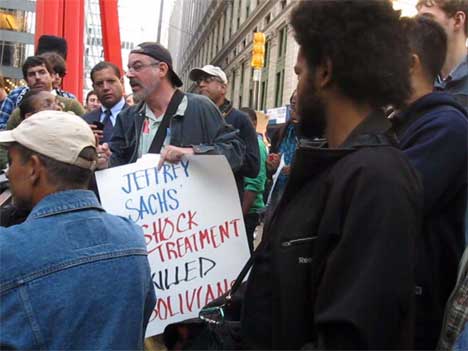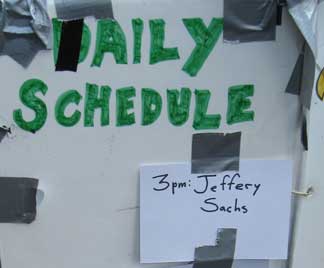
October 2011
Internationalists Protest Imperialism’s “Dr. Shock”
Jeffrey Sachs Doing at Occupy Wall Street?

Jeffrey Sachs speaking at Occupy Wall Street, October 7. (Photo: © lcnashdesign)
“Jeffrey Sachs is speaking at Occupy Wall Street? That can’t be,” a union activist at the City University of New York cried out when she heard the latest from the protest encampment in downtown Manhattan. But it was true. The fact that this top capitalist privatizer and imperialist criminal was invited to spout off Friday, October 7 at “OWS” says a lot about the agenda of those who invited him.
Who Is Jeffrey Sachs?
I - Decimating the Bolivian Working Class
“Widely
considered to be the leading
international economic adviser of his
generation” (in the words of his
official bio on the
Jeffrey Sachs
gained notoriety for advocating and
implementing what
is now called “neoliberal” capitalist
economics with a vengeance. Following
in the footsteps of Milton Friedman’s
“Chicago Boys” – who helped the
dictator Augusto Pinochet in mid-1970s
Determined to smash the combative tin miners who were the backbone of the Andean country’s radical labor movement, newly elected president Víctor Paz Estenssoro and his ally, former military dictator Hugo Banzer, put forward a “new economic policy” which – in the words of the standard history of U.S.-Bolivia relations – “had a certain ‘made in the USA’ stamp about it”:
“Its primary
architect was Jeffrey Sachs, a bright,
brash, young Harvard professor whom
the Los
Angeles Times called ‘the
Indiana Jones of economics.’ Its
domestic manager was Planning Minister
Gonzalo Sánchez de Lozada, a
businessman who had spent so much time
in the
“The social costs...were immense.... Paz passed the costs of stabilization on to the lower classes. In the new era [of neoliberal economics], Paz looked to Sachs and Machiavelli.... The statistical details roll by too quickly for an outsider to fully grasp the human costs. In 1986 the purchasing power of the average Bolivian was down 70 percent.... Unemployment reached 20-25 percent, and nearly all social welfare benefits to workers were swept away.”
– Kenneth D.
Lehman,
The assault on Bolivian workers was embodied in the most hated piece of legislation in the country’s history: Supreme Decree 21060, which virtually illegalized strikes while shutting the mines, firing the vast majority of miners and “relocating” more than 20,000 of them to tropical areas. “Following the advice of Harvard economist Jeffrey Sachs, whose neoliberal ‘shock treatments’ would later be applied to Eastern Europe and the former Soviet Union to devastating effect, [it] cut government spending, overhauled the monetary system – thereby bringing a halt to hyperinflation while plunging the economy into recession – and encouraged foreign investment...” (Forrest Hylton and Sinclair Thomson, Revolutionary Horizons: Past and Present in Bolivian Politics [2007]).
Just as
Milton Friedman was able to turn
In 1997, Gonzalo Sánchez de Lozada – who had since become Bolivia’s president with the support of a coalition of center and right-wing parties – visited Harvard’s Kennedy School of Government, where “Jeffrey D. Sachs, director of the Harvard Institute for International Development (HIID), introduced the president as one of Latin America’s boldest and most creative leaders,” calling the president and his advisers “the main authors of economic reforms for Bolivia.” Sachs added: “My role was partly to motivate the idea of quick stability, and to help with technical aspects of the reform” (Harvard University Gazette, 8 May 1997).
With Sachs’s
help, Bolivian mines, nationalized in
1952, were largely privatized, opening
the door to Wall Street investors.
Known derisively as el
gringo Goni, Sánchez de
Lozada launched a massacre against
miners, indigenous peasants and the
urban poor in October 2003. However,
he failed to crush the “Gas War”
uprising that eventually overthrew him
and drove him into exile in
II
– Implementing Counterrevolution in
Having earned
his spurs in
At first,
Sachs proposed “U.S.-style corporate
structures, with professional managers
answering to many shareholders and a
large economic role for stock
markets.” When this failed to catch
on, “Sachs came back with a Germanic
idea – large blocks of the shares of
privatized companies would be placed
in the hands of big banks,” as Left
Business Observer (August 2005)
noted (“The Long, Strange Career of
Jeffrey Sachs”). Lionized by
anti-communists, Walesa’s capitalist
restoration meant mass unemployment
(even the
For
In recent
years, Dr. Shock has sought to rebrand
himself as a liberal
neoliberal with hipster cred. MTV
broadcast a multipart “Diary of
Angelina Jolie and Dr. Jeffrey Sachs”
touring
But Sachs’s
criticisms of corporate funding of
political campaigns, proposals to “tax
the rich” and calls to “rebuild
“This Man Is A Criminal Enemy of the Working Class”
At an October 7 conference on “Defending Public Higher Ed,” organized by the Professional Staff Congress union of faculty staff at the City University of New York (CUNY), speaker after speaker praised the Occupy Wall Street protest, while a CUNY Internationalist Clubs activist warned that the protests are dominated by bourgeois populism. Minutes later the word spread that Sachs was speaking at OWS. Hastening to the square, Internationalist supporters saw Sachs, having finished his presentation, chatting with the crowd.
A CUNY
adjunct who teaches Latin American
history and has written extensively on
the struggles of Bolivian miners broke
through the atmosphere of adulation to
denounce Sachs: “What about
 Denouncing appearance of
“Dr. Shock,” Jeffrey Sachs, at
Occupy Wall Street, October 7.
(Internationalist
photo)
Denouncing appearance of
“Dr. Shock,” Jeffrey Sachs, at
Occupy Wall Street, October 7.
(Internationalist
photo)
After a brief attempt to disclaim responsibility for the results of his policies, Sachs turned tail and quickly departed. Many in the crowd applauded our comrade – while others were aghast that he did not “converse” with the esteemed economist, or accept that “people change” – after all, Sachs now styles himself an environmentalist and all-round friend of humanity. As if the posturing of this economic hit man and his pandering to the latest political fads could erase the devastation he helped inflict on millions around the world.
While some
Occupy Wall Street (OWS) supporters were
incredulous that such a criminal
character would be invited, the
information table sported a sign
publicizing his 3 p.m. talk as part of
the OWS events calendar. “Jeffrey Sachs
Sings the Praises of
A YouTube video (http://www.youtube.com/watch?v=H8svbm4WYmU) shows Sachs surrounded by admiring listeners as he says he “loves” OWS, pushes nostrums about “a more inclusive economy” and “tax the rich,” and pontificates about the need for “a new model of campaigning” based not on “big bucks” but on “the free media and social networks and Twitter.” He also took the opportunity to hand out some copies of his latest tome, The Price of Civilization.
 When we
questioned the staffer at the OWS
information table about why Sachs was
invited, she responded: “Everybody has
the right to speak.” Would you then
invite Augusto Pinochet to speak here,
we asked. “Absolutely! I’d have a lot of
questions to ask him,” she responded.
Expressed as free-wheeling classless
tolerance, this is actually the voice of
imperialist liberalism for which death
and destruction in
When we
questioned the staffer at the OWS
information table about why Sachs was
invited, she responded: “Everybody has
the right to speak.” Would you then
invite Augusto Pinochet to speak here,
we asked. “Absolutely! I’d have a lot of
questions to ask him,” she responded.
Expressed as free-wheeling classless
tolerance, this is actually the voice of
imperialist liberalism for which death
and destruction in
While almost all of the left has devoted itself to uncritical enthusing over OWS, the fact is that bourgeois populism has been the ideological glue holding together (so far) the mélange of forces assembled there. Among those camped out in the square are young anarchists and there are signs calling for “class war” – along with many variants of reformist socialist groups, a whole lot of disgruntled Obama supporters and quite a few people who aren’t sure what they think should be done but are very unhappy about the state of society today.
At the same time, devotees of the ultra-rightist (and racist) Ron Paul, rightist Libertarians and followers of the fascist Lyndon LaRouche are regulars in and around the square. Calls to “End the Fed” (Federal Reserve) mix with a plethora of proposals to tinker with the financial system, tax the rich, reform campaign finance, and so forth. And they are accompanied by patriotic appeals, from “We the People” rhetoric to American flags. The second issue of The Occupied Wall Street Journal (8 October) features “Reports from intrepid, heartfelt, truly patriotic occupiers everywhere.”
That Jeffrey
Sachs can show up and make sound bites
from some of the key phrases of OWS
itself is significant. It should be food
for thought for those leftist-minded
youth and labor activists who have
gravitated to
In response to
our comrade’s denunciation of Dr. Shock,
a young admirer in the crowd called out
“That’s debatable.” A
companion scolded that instead of
denouncing Sachs, we should have engaged
in a dialogue with him. “You want to
debate mass starvation and army
repression? Tell it to the workers and
peasants of
For OWS to give
a platform to the notorious Dr. Shock,
Jeffrey Sachs, was a slap in the face to
the millions he victimized, from
To contact the CUNY Internationalist Clubs, send e-mail to: cunyinternationalists@gmail.com
To contact the Internationalist Group and the League for the Fourth International, send e-mail to: internationalistgroup@msn.com